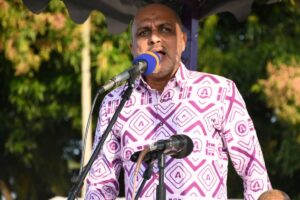Zanzibar — TO the former Zanzibar president, Amani Karume, the idea of becoming a leader of the country never crossed his mind before because he did not like politics in the first place. Not that he doubted his ability to lead and perform. The first born to the founding and perform.
The first born to the founding President of Zanzibar, Abeid Amani Karume, is known for his political savvy and strong management skills when he worked in the Revolutionary Government of Zanzibar as Chief Treasurer and Principal Secretary in various ministries in the 1970.
He has been credited for hard work and dedication and for maintaining professional integrity in the workplace during that time.
Dr Karume told Tanzania Standard Newspapers Limited’s (TSN) editorial team in a recent exclusive interview in Unguja that it did not occur to him that he would become a politician simply because did not like politics and the government system with a lot of red tapes.
“I hate the excessive government bureaucracy. I have always enjoyed doing my things, freely,” he said in response to what was his inspiration for politics.
His dislike to politics contributed to his focus on private life after a tour of office in the 1970’s. He either did not fancy the idea of being president like his father. He preferred to lead private life and manage his businesses.
However, some elders had different ideas. An academic product of Unguja-based Lumumba Secondary School, the 76-year-old Karume joined the government in 1970 as an accountant and in one decade he rose through the ranks to become principal secretary in three different ministries.
The dockets he served with the years in brackets are finance (1971-1974); planning (1974-1978); and communications and transport (1978-1980).
“After ten years in the government, I willingly opted out to work privately where enjoyed my freedom. As I have said, I have issues with government overly bureaucracy,” Dr Karume said.
In the private sector, the former Isles leader worked for hardly five years before a group of elders whom he describes as “my late father’s friends,” approached him in 1985, asking him to stand for Raha Leo’s seat in the Zanzibar’s House of Representatives. “I initially refused but they insisted on me to rethink. I continued with my works unaware that they were serious about the proposal,” Dr Karume says, adding that the same group approached him with the same demand in the 1990 polls. “This time I agreed…I picked the form and thanks to their support and all voters, I entered the House of Representatives triumphantly with a landslide victory,” he said.
Dr Karume served as Raha Leo’s representative for two consecutive terms after he was re-elected in 1995. And, luckily, he was in the cabinet during all his periods in the House of Representatives.
His predecessor Dr Salmin Amour nominated him as Minister of Trade in 1990 through 1995 and Minister for Communications and Transportation from 1995 to 2000.
“Hopefully, I performed well in the eyes of my constituents. The same elders approached me in 2000, this time with a bigger proposal – the presidency,” Dr Karume recalls, adding: “I had never imagined the presidency.” He says he had no fear because he was familiar with the government operations and knew what was waiting ahead of him. “So, you can see again, it wasn’t me but elders and all Zanzibaris who wanted me into the presidency.
Otherwise, with my only one vote, there was nothing I could do to become president.” Yet, it was a hard and challenging time for Dr Karume to decide. While his father’s friends whom he said he respected craved for him to assume the presidency, his family was against it.
“My entire family – wife and children – opposed the idea of me vying for the presidency and sincerely speaking I assumed the office at the expense of my family,” he says, adding: “In my entire period of the presidency, my family was not very happy.
Happiness returned only after my retirement.” He became the president of the Indian ocean archipelago and was the only Zanzibar leader who did not sleep in the State House. “Of course, I slept in State House in my childhood, during my father’s reign (but) during my time (as a leader), I decided to stay at home to at least comfort the family.” He firmly believes that life at his own home was a relief to the family as compared to the tight security at the State House.
“Security was not as tight as State House. Remember this is my home, so unlike State House, I had discretion on some issues and my family members were relatively free.” Many parents wish their children to pursue their careers but not the former Isles leader who has discouraged his children from politics. “The least I would wish to see is one of my children entering politics,” he said.
“I discouraged all my children from politics and so far I haven’t seen any with that interest,” he says, noting that with his wife Shadya, God has blessed them with six children-two boys and four girls. During his leadership, Dr Karume groomed many leaders, with President Samia Suluhu Hassan being one of the products he is proud of. “I saw in her leadership talents and gladly I was right,” he said.
Who is Amani Abeid Karume?
Amani Abeid Karume was former president of Zanzibar holding the office from November 2000 to November 2010. He is the son of Zanzibar’s first president, Abeid Karume, and a member of the Chama Cha Mapinduzi (CCM) party.
Early life and career
A Muslim born in 1948, Karume was schooled at the Lumumba Secondary School until 1969 when he became an accountant.
During the 1970s he held various positions in the Revolutionary Government of Zanzibar including Chief Treasurer (1970-1971), Principal Secretary in the Ministry of Finance (1971-1974), Principal Secretary in the Ministry of Planning (1974-1978), and Principal Secretary in the Ministry of Communications and Transport (1978-1980). During the 1980s, he worked as a private consultant for a British-based business in Zanzibar.
Karume returned to government and politics in 1990 when he was elected to the Zanzibar House of Representatives from the Raha Leo constituency. In 1995, he was re-elected to that position in multiparty polls. He entered politics in 1990, running for Raha Leo constituency as a Zanzibar Member of Parliament.
He was thereafter nominated as the Minister of Trade from 1990-1995 by President Salmin Amour. In 1995, he was re-elected for the same constituency and thereafter nominated as the Minister of Communication and Transportation.
Karume ran as CCM presidential candidate for Zanzibar and won 67.04 per cent of the vote in an October 2000 election. He was re-elected in the 30 October 2005 election, winning by 53.18 per cent Karume is married and is the father of six adult children.
Source: allafrica.com














